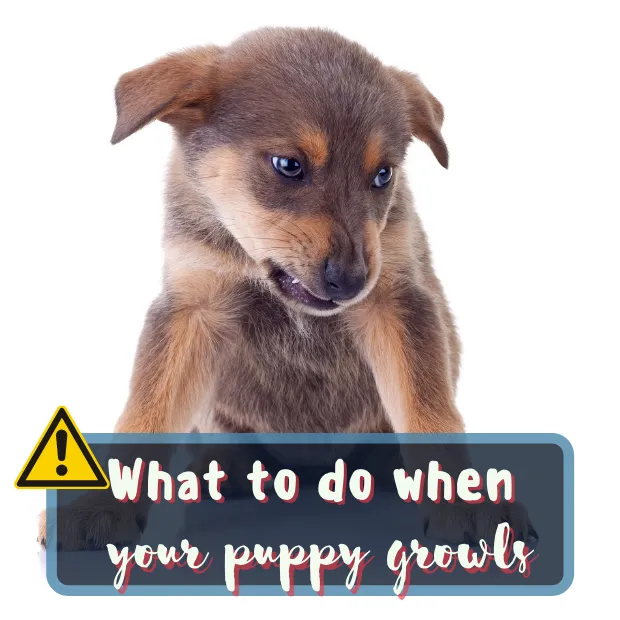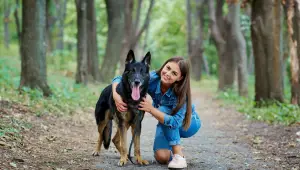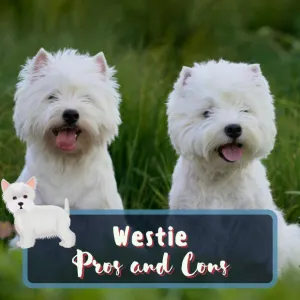Table of Contents
ToggleIf my puppy growls at me, are they being aggressive?
Puppies can be a handful, but when they give you a growl it might make you worry. Do I have an aggressive puppy? Or is he going to bite me? Is this how true aggression starts? Should you punish your dog? How do I teach the puppy this isn’t right?
These are all questions that come to mind for pet owners who have dealt with a growling youngster, and it’s all about contexts and risk. In this article we will look at what to do if your normally friendly puppy is growling at you and how to avoid it in the future!
The first step to fixing the problem is understanding why these behavior issues might be occurring. It’s not necessarily bad news – it’s perfectly normal puppy communication, so let’s have a look at different types of growl, potential reasons and the under lying emotion.
Puppy Growl #One: “I’m Mad At You”
A growling dog sometimes means he’s mad. If your furry friend grumbles at you and gives you a hard expression, it might be because he’s feeling frustrated or upset with something that you’ve done. Maybe you moved too quickly for him, or maybe you took something away from him that he was enjoying – whatever the reason may be, this usually happens when the puppy is close to you and is meant as a warning.
In this case, change the situation – you’ll want to stop whatever you’re doing that’s making your pooch angry and give them some time to calm down. Once they’ve calmed down, start reintroducing things slowly, so they don’t get frustrated again. If you continue doing things that make your puppy mad, this may escalate into your puppy biting you if you don’t listen to them!
If your dog starts growling when you walk past his food bowl, this could be resource guarding, also known as possession aggression. Move your dog’s dish to a quiet spot that is out of the main flow of pedestrian traffic in the household so your pooch can eat in peace without fear that anything is going to be taken.
Definitely never put your hands near your dog’s dish whilst they are eating and don’t take away high value items (such as a pig ear chew) without trading. This may require a behaviour modification program and some training sessions from a qualified animal behaviorist.
Remember that your youngster will have a shorter fuse when they’re overtired so make sure they are getting plenty of sleep, especially if they seem to be going through that particularly heavy biting phase between 12-24 weeks of age.
Puppy Growl #Two: “I’m Worried”
A dog that’s scared might also start to vocalise in this way. This is often because the dog wants to keep his distance from what he perceives as a threat, so if Fido starts showing this behavior it could be because of something in the environment that’s making him scared.
It’s important to note that not all growling is bad – in fact, grumbles from a behaviorally healthy dog can actually be helpful in terms of letting you know when your pup is feeling uncomfortable in stressful situations. However, if it starts happening more often then it might be worth getting to the bottom of what’s scaring your dog.
As soon as you notice him start to stress growl, try and figure out exactly why he might be scared – does it have something to do with a person or animal in the environment? Is there some sort of loud noise that scares him (like fireworks)? Whatever it may be, once you know the root of the problem, you can start to work on fixing it so he’s not worried by whatever it is when he’s an adult dog.
This can be a difficult behavior to deal with, because often the thing that’s scaring your furry friend is out of your control. However, you can try to help him overcome his fears by slowly exposing him to whatever he’s afraid of.
For example, if loud noises appear to worry them, you might try playing some music for him whilst feeding him some yummy treats, teaching the puppy that noises mean good things! If the noise doesn’t worry him, then you can slowly increase both the volume and duration. The key here is to go at your dog’s pace and not force him into anything that he’s not ready for, to prevent your puppy from becoming even more scared.
Puppy Growl #Three: “I’m Playing”
Sometimes dogs vocalise when they want to engage with you or another dog in play. In order to determine if this is the case, you’ll need to look at your puppy’s movements – do they look playful?
If you think that your pooch might be trying to engage with you in some sort of game, then go for it! Signs of puppy wanting to initiate a game include play bows (elbows on the floor, butt in the air!), and loose, relaxed behavior, wriggly movement with a wagging tail that is not stiff.
Let him know that you’re playing too by initiating some playful behaviors of your own or have a game of tug with a rope toy, this will give them plenty of exercise and an outlet for their energy.
However, if it seems like their happy growl is becoming too over-the-top and your puppy is over stimulated then it might be time to end the game.
The bottom line?
When it comes to puppy growling, there can be many different causes behind it but it’s normal canine behavior. It’s important to pay attention to both the type of growling your furry friend is giving you and his body language. If it seems like he’s trying to tell you something, then try not to take it personally – if anything, just give him some space before starting up playtime again!
Should I be worried if my puppy growls at me?
You should definitely try and determine why they are growling and if it’s not clear it may be worth engaging a positive reinforcement trainer to help you. Always rule out pain or illness as an underlying issue if your dog’s behaviour has suddenly changed, as they may need medical treatment.
Never, ever tell your puppy off for growling. Punishing your dog for growling is like taking the batteries out of your smoke alarm. Growling is communication and if a dog is subjected to punishment methods for growling they may feel the need to skip to the next step on the ladder of communication to get their point across – this is how dog bites happen “out of the blue”.
Once you’ve determined the underlying emotion, you can work on fixing the problem. If it’s “I’m scared” then try to gently expose him to whatever is scaring him whilst using treats to create a better association, if it’s “I’m playing” then engage with him in play, and if it’s “I’m mad at you” work out what is making him frustrated.
The bottom line? If Fido is giving a growl, don’t be scared – just understand why he might be doing it!
Check out this post on what to do if your dog barks at visitors.







